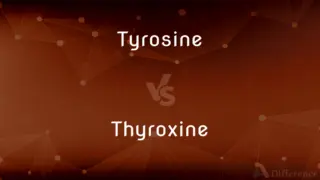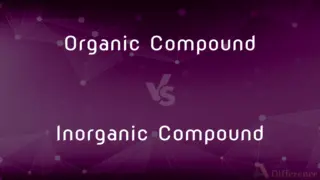Glucose vs. Fructose — What's the Difference?
By Tayyaba Rehman & Urooj Arif — Updated on March 15, 2024
Glucose and fructose are both simple sugars, but glucose is a key energy source for cells, whereas fructose is sweeter and found in fruits.

Difference Between Glucose and Fructose
Table of Contents
ADVERTISEMENT
Key Differences
Glucose is a primary energy source for our bodies, critical for cellular function and metabolism. It circulates in the blood and is regulated by insulin. Fructose, on the other hand, is metabolized differently, primarily in the liver, and does not directly raise blood glucose levels. This difference is crucial for understanding their roles in nutrition and health.
While glucose is involved in the glycolysis pathway, providing ATP for cellular activities, fructose metabolism bypasses the regulatory steps of glycolysis. This can lead to increased lipogenesis, contributing to fatty liver and insulin resistance in excessive amounts. Thus, the metabolic pathways of these sugars indicate their differing impacts on health.
Glucose's role in blood sugar regulation is significant, as it directly influences insulin release and blood sugar levels. Fructose, whereas, has a minimal immediate impact on blood sugar, making it less disruptive in the short term but potentially harmful in large quantities over time.
In terms of natural sources, glucose is abundant in starch-rich foods like grains and potatoes. Fructose, on the other hand, is primarily found in fruits, honey, and some vegetables, contributing to their sweetness.
Despite their differences, both glucose and fructose are essential in the human diet, but their consumption must be balanced. Overconsumption of fructose, particularly from processed foods and sweeteners, is linked to health issues, unlike glucose, which is more central to basic metabolic processes.
ADVERTISEMENT
Comparison Chart
Primary Function
Energy source for cells, aids in metabolism.
Sweetens foods, metabolized in liver.
Metabolic Pathway
Glycolysis, regulated by insulin.
Liver metabolism, bypasses glycolysis control.
Impact on Blood Sugar
Directly raises blood sugar levels.
Minimal immediate impact on blood sugar.
Natural Sources
Starch-rich foods like grains, potatoes.
Fruits, honey, some vegetables.
Health Implications
Essential for cellular function, energy.
Excess linked to fatty liver, insulin resistance.
Compare with Definitions
Glucose
A key player in cellular respiration and energy production.
Glucose is metabolized during glycolysis to produce ATP.
Fructose
Metabolized primarily in the liver, unlike other sugars.
Fructose consumption can lead to liver stress if excessive.
Glucose
A critical component of blood sugar, influencing diabetes management.
Diabetics must monitor their glucose intake closely.
Fructose
A fruit sugar that is one of the sweetest naturally occurring sugars.
Fructose is responsible for the sweetness of ripe fruits.
Glucose
A simple sugar that is an important energy source in living organisms.
Glucose levels in the blood are regulated by insulin.
Fructose
Does not spike blood sugar levels as glucose does.
Fructose has a lower glycemic index compared to glucose.
Glucose
Often used in medical settings to provide energy.
Glucose solutions are administered intravenously in hospitals.
Fructose
Found in high fructose corn syrup, a common sweetener.
Many processed foods contain fructose as a sweetening agent.
Glucose
The most common monosaccharide, a building block of carbohydrates.
Glucose can be obtained from breaking down starch.
Fructose
Associated with health concerns when consumed in large amounts.
High fructose intake is linked to metabolic syndrome.
Glucose
Glucose is a simple sugar with the molecular formula C6H12O6. Glucose is the most abundant monosaccharide, a subcategory of carbohydrates.
Fructose
Fructose, or fruit sugar, is a ketonic simple sugar found in many plants, where it is often bonded to glucose to form the disaccharide sucrose. It is one of the three dietary monosaccharides, along with glucose and galactose, that are absorbed directly into blood during digestion.
Glucose
A simple sugar which is an important energy source in living organisms and is a component of many carbohydrates.
Fructose
A sugar of the hexose class found especially in honey and fruit.
Glucose
A monosaccharide sugar, C6H12O6, that is used by living things to obtain energy through the process of aerobic respiration within cells. It is the principal circulating sugar in the blood of humans and other mammals.
Fructose
A very sweet monosaccharide sugar, C6H12O6, occurring in many fruits and in honey, and used as a preservative for foodstuffs and as an intravenous nutrient. Also called fruit sugar, levulose.
Glucose
A colorless to yellowish syrupy mixture of dextrose, maltose, and dextrins containing about 20 percent water, used in confectionery, alcoholic fermentation, tanning, and treating tobacco. Also called starch syrup.
Fructose
(carbohydrate) A monosaccharide ketose sugar, formula C6H12O6.
Glucose
(carbohydrate) A simple monosaccharide (sugar) with a molecular formula of C6H12O6; it is a principle source of energy for cellular metabolism.
Fructose
Fruit sugar; levulose.
Glucose
A variety of sugar occurring in nature very abundantly, as in ripe grapes, and in honey, and produced in great quantities from starch, etc., by the action of heat and acids. It is only about half as sweet as cane sugar. Called also dextrose, grape sugar, diabetic sugar, and starch sugar. See Dextrose.
Fructose
A simple sugar found in honey and in many ripe fruits
Glucose
Any one of a large class of sugars, isometric with glucose proper, and including levulose, galactose, etc.
Glucose
A monosaccharide sugar that has several forms; an important source of physiological energy
Common Curiosities
What is glucose?
Glucose is a simple sugar essential for energy production in the body.
How does the body use glucose?
The body uses glucose as a primary energy source, metabolized by cells.
Where is fructose found?
Fructose is found in fruits, honey, and some vegetables.
Can fructose affect health?
Yes, excessive fructose consumption is linked to health issues like fatty liver.
What is fructose?
Fructose is a sweet-tasting sugar found primarily in fruits and honey.
Where is glucose found?
Glucose is found in carbohydrates like bread, rice, and potatoes.
Is one healthier than the other?
Both sugars are important, but their health effects vary with consumption patterns.
Is fructose in fruit bad for you?
In whole fruits, fructose is part of a healthy diet due to accompanying fibers and nutrients.
How is fructose metabolized?
Fructose is primarily metabolized in the liver, differing from glucose.
Can you substitute glucose for fructose in recipes?
Substitution can affect sweetness and texture, as fructose is sweeter.
Do all fruits contain fructose?
Most fruits contain fructose, contributing to their sweet taste.
How do glucose and fructose affect diabetes?
Glucose directly impacts blood sugar levels, whereas fructose has a minimal immediate effect.
Are glucose and fructose found together?
Yes, they are often found together in foods, especially fruits and sweeteners.
What are the main dietary sources of glucose and fructose?
Glucose is mainly from starchy foods, while fructose is from fruits, honey, and some sweeteners.
How does the body regulate glucose?
The body regulates glucose through insulin, maintaining energy balance.
Share Your Discovery

Previous Comparison
Territory vs. State
Next Comparison
Cheese vs. ButterAuthor Spotlight
Written by
Tayyaba RehmanTayyaba Rehman is a distinguished writer, currently serving as a primary contributor to askdifference.com. As a researcher in semantics and etymology, Tayyaba's passion for the complexity of languages and their distinctions has found a perfect home on the platform. Tayyaba delves into the intricacies of language, distinguishing between commonly confused words and phrases, thereby providing clarity for readers worldwide.
Co-written by
Urooj ArifUrooj is a skilled content writer at Ask Difference, known for her exceptional ability to simplify complex topics into engaging and informative content. With a passion for research and a flair for clear, concise writing, she consistently delivers articles that resonate with our diverse audience.
















































